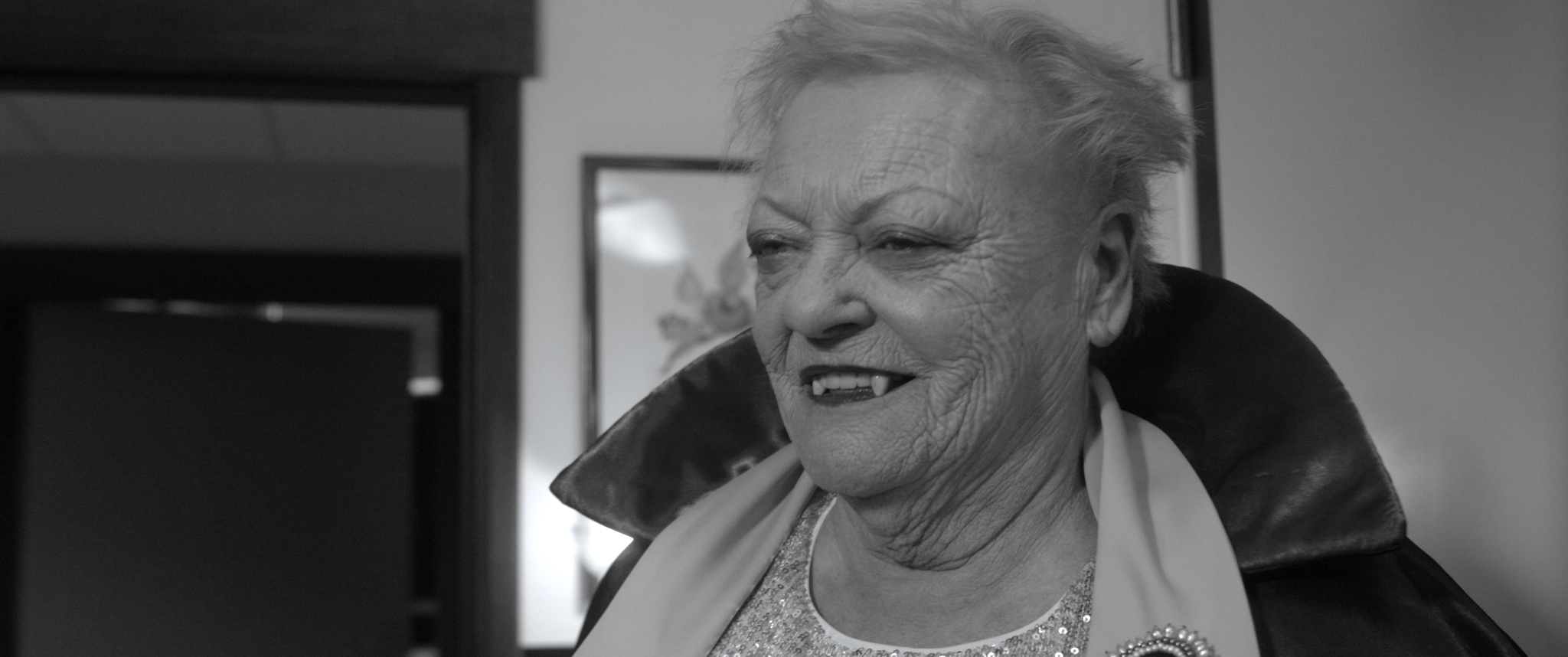OLGA’S EYES
dir. Sarah Carlot Jaber

Contemporary media has largely departed from the murderous, monstrous depictions of the vampire. Even Robert Eggers’s Nosferatu (2024) seems to depict a Count Orlok who is motivated by a strange, deeper connection as opposed to the vengeful (and antisemitic) bloodthirst present in the original. While there are outliers, we often crave humanized vampires.
Lestat de Lioncourt grapples with the ethical implications of his thirst (Interview with the Vampire, 1994). Tomas Alfredson’s Let the Right One In (2008) examines an unlikely friendship between the paranormal and “normal.” More recently, Ariane Louis-Seize’s Humanist Vampire Seeking Consenting Suicidal Person follows an unusually sympathetic and reluctant vampire. Even the Cullens are vegetarian (Twilight, 2008).
Still, as Belgian director Sarah Carlot Jaber has proven with “Olga’s Eyes,” there is much more to explore when it comes to the contemporary vampire tale.
An octogenarian, Olga (Viviane de Muynck), sits on the stairs in her large estate. With tears in her eyes, she watches her daughter hurry boxes around the home she once knew. Her daughter, Simone (Erika Sainte), says that a real estate agent was supposed to stop by. In a wide shot, we see that Olga is clutching to this estate agent’s corpse, bloodless and pale.
“We’ve eaten the entire neighborhood,” Simone says. “You can’t stay here.”
Olga seems pained both by the transgression and her impending disposal to a retirement home.
“You’ll deal with those who have one foot in the grave,” Simone tells her.
This is where Jaber distinguishes herself: the subject. Many elements of “Olga’s Eyes” mirror some of those present in the comedy-horror Humanist Vampire Seeking Consenting Suicidal Person. Both vampire protagonists are reluctant to kill, instead opting instead to drink from blood transfer bags, and when they do strike, the victim often deserves it to some degree. Likewise, both protagonists form connections through music and find unlikely companionship with another human or humans.
But Jaber’s protagonist is assumedly in her eighties, and for that reason alone, we might assert that she is nothing like the other vampires depicted in contemporary media. We may assume, too, that this is not a coming-of-age film.
What life is to be lived, what blood is to be sucked (or not sucked, for that matter) inside the sterile, geriatric halls of a retirement home? Jaber answers with a resounding: “Just you wait and see.”
Vampirism is only the premise of “Olga’s Eyes” as opposed to an all-encompassing plot. Instead, the short is guided by more resonant human facets of life that makes it altogether more compelling.
With just a 22-minute runtime, “Olga’s Eyes” examines motherhood, community formation, romance, sexual violence, and so much more. More than anything, it assigns vibrant personhood to the elderly, which they aren’t often afforded both in the media and in the fabric of our reality. Here we can see broader criticisms of the nuclear family and capitalism in Jaber’s work.
Jaber’s style is impeccable, too. The short features a distorted black-and-white filter for most of the runtime that is complimented by absurd, campy shots and equally campy dialogue. Nothing falls flat.
I often find myself thinking about the chalk scrawled on the pavement at the end of Jane Schoenbrun’s horror feature I Saw the TV Glow: “There is still time.” Schoenbrun’s primary message regarding gender identity and expression has lingered with me since I saw the film, but I have been struck by the pertinence of that chalk sentiment more generally in relation to the Other.
Good horror showcases the monstrous. Great horror explores the Other—the ways in which societal constructions reinforce the status of the so-called monster.
Sarah Carlot Jaber doesn’t waste too much time examining Olga the Vampire. However, she dives headfirst into unpacking Olga the Octogenarian, and her message is clear:
There is still time to dance, to love, to build a community with your peers, and, if you’re lucky, there might be a little time to suck some blood, too.
Kaelyn New is a writer and editor from Denver, Colorado. She recently graduated from Gonzaga University with a dual major in English Writing and Political Science as well as a minor in Women, Gender, and Sexuality Studies. When she isn’t working, she is likely watching horror movies, making music, or spending time with her adopted black cat, Salem, that crossed her path over two years ago.
